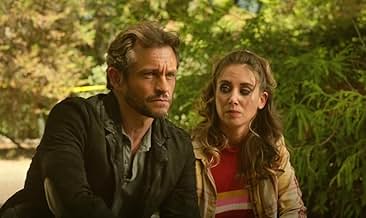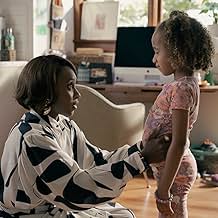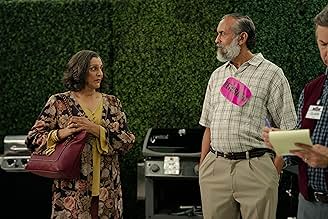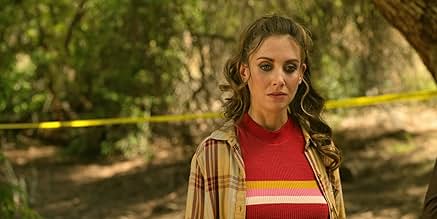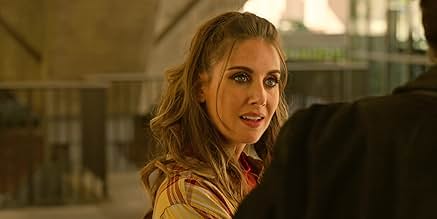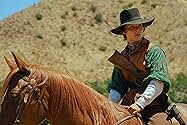Con un elenco lleno de estrellas, esta serie de antología entrelaza ocho fábulas de humor negro feminista y aborda temas como los roles de género, la autonomía y la identidad.Con un elenco lleno de estrellas, esta serie de antología entrelaza ocho fábulas de humor negro feminista y aborda temas como los roles de género, la autonomía y la identidad.Con un elenco lleno de estrellas, esta serie de antología entrelaza ocho fábulas de humor negro feminista y aborda temas como los roles de género, la autonomía y la identidad.
- Premios
- 1 nominación en total
Explorar episodios
Opiniones destacadas
8thao
This feminist themed anthology short film series is a lot of fun. Original, fresh and playful. For some reason it only gets 5.3/10 here on IMDb. I'm guessing because it has a feminist perspective. Don't let that stop you. There are a lot of things that irritate me in feminism but also a lot I like - and this I liked.
Some of the short films are better than others, as usually in anthology short film series but none of them were bad (IMO).
By the way, what's with the hatred of films and series that deal with the experience of women or remakes where women are in the leading roles men had before? Why does it threaten people to have a new perspective? Or even to see something they might disagree with?
Some of the short films are better than others, as usually in anthology short film series but none of them were bad (IMO).
By the way, what's with the hatred of films and series that deal with the experience of women or remakes where women are in the leading roles men had before? Why does it threaten people to have a new perspective? Or even to see something they might disagree with?
I was expecting more from this series. The stories felt a bit off, some confusing and like the writers couldn't think of a coherent ending so they just left it like that. Had some good actors, some funny moments, some horrific moments and over all, a lot of sadness. That's all I got from this. Like I said, underwhelmed.
The frustrating thing about these magical realism, Twilight Zone-ish tales, is that they start out intriguing, draw you in, and nearly every one of them ends with an anticlimactic thud.
They are all well-acted and handsomely produced, but speaking of The Twilight Zone, the ending of each of those was the best part!
If the stories these are based on didn't pay off at the end, then the clearly talented writers should have fixed that.
They are all well-acted and handsomely produced, but speaking of The Twilight Zone, the ending of each of those was the best part!
If the stories these are based on didn't pay off at the end, then the clearly talented writers should have fixed that.
You have to tune in just to see Nicole Kidman and Judy Davis going head-to-head, but there's a lot more to enjoy in this poignant yet whimsical anthology series from GLOW creators Liz Flahive and Carly Mensch.
The series is based on a collection of short stories by Irish writer Cecelia Ahern, and each of the eight half-hour episodes brings its own splash of magical realism or Black Mirror-style sci-fi as it illuminates a different facet of female experience. Common themes wend throughout, but the tone of each individual episode is different.
There's a layered melancholy to Kidman's and Davis's episode, The Woman Who Ate Photographs, which is made all the more resonant by the nostalgic ordinariness of its Australian setting. Kidman plays a woman nearing the end of her tether as she sets off in a moving van to bring her Alzheimer's-afflicted mother (Davis) to live with her and her husband and son (Simon Baker and Kai Lewins), who aren't giving her quite the support that she needs.
It's fun to see Kidman slapping the steering wheel while singing along to Midnight Oil and Dexys Midnight Runners, but Australian director Kim Gehrig, who has made music videos for Chaka Khan and Brittany Howard, among others, extracts a real ache from the NSW scenery, not least the rural brick veneer in which Davis' character has been rattling around on her own.
Davis, who was so devastatingly brilliant recently in Nitram (Stan), produces another emotionally piercing performance as a woman who is by turns hostile, vulnerable, disapprovingly distant, mischievous and scared. The gulf between mother and daughter yawns like the Burragorang Valley in what is a memorable little piece of work.
GLOW fans, meanwhile, will particularly enjoy other episodes involving Alison Brie as a ghost investigating her own murder, and Betty Gilpin as a woman whose husband keeps her, quite literally, on a shelf - at least until she busts out into an old-timey dance number, whirling through a thoroughly modern and thoroughly bemused Los Angeles.
Issa Rae (Insecure) delivers a particularly strong performance in what is paradoxically one of the series' weaker episodes, about a successful black writer feeling increasingly invisible to the white showbiz world that's courting her; and Merritt Wever is typically amazing as a woman whose dead-end dating life takes a strange turn when she meets a charming male-feminist duck.
Streaming services are glutted with anthology series, but we still needed this one. Truthful, validating and sometimes just plain magical.
The series is based on a collection of short stories by Irish writer Cecelia Ahern, and each of the eight half-hour episodes brings its own splash of magical realism or Black Mirror-style sci-fi as it illuminates a different facet of female experience. Common themes wend throughout, but the tone of each individual episode is different.
There's a layered melancholy to Kidman's and Davis's episode, The Woman Who Ate Photographs, which is made all the more resonant by the nostalgic ordinariness of its Australian setting. Kidman plays a woman nearing the end of her tether as she sets off in a moving van to bring her Alzheimer's-afflicted mother (Davis) to live with her and her husband and son (Simon Baker and Kai Lewins), who aren't giving her quite the support that she needs.
It's fun to see Kidman slapping the steering wheel while singing along to Midnight Oil and Dexys Midnight Runners, but Australian director Kim Gehrig, who has made music videos for Chaka Khan and Brittany Howard, among others, extracts a real ache from the NSW scenery, not least the rural brick veneer in which Davis' character has been rattling around on her own.
Davis, who was so devastatingly brilliant recently in Nitram (Stan), produces another emotionally piercing performance as a woman who is by turns hostile, vulnerable, disapprovingly distant, mischievous and scared. The gulf between mother and daughter yawns like the Burragorang Valley in what is a memorable little piece of work.
GLOW fans, meanwhile, will particularly enjoy other episodes involving Alison Brie as a ghost investigating her own murder, and Betty Gilpin as a woman whose husband keeps her, quite literally, on a shelf - at least until she busts out into an old-timey dance number, whirling through a thoroughly modern and thoroughly bemused Los Angeles.
Issa Rae (Insecure) delivers a particularly strong performance in what is paradoxically one of the series' weaker episodes, about a successful black writer feeling increasingly invisible to the white showbiz world that's courting her; and Merritt Wever is typically amazing as a woman whose dead-end dating life takes a strange turn when she meets a charming male-feminist duck.
Streaming services are glutted with anthology series, but we still needed this one. Truthful, validating and sometimes just plain magical.
Each episode ends abruptly; and on parts that simply need to be explained more. It's left me feeling agitated and dissatisfied. It's like they are trying to be mysterious by being obscure and I think most people are tired of the genre of "It's open to interpretation." Messages are vague, and there should be sufficient endings, because I just feel like I'm being teased.
On the positive side, the cinematography is great, and the women in this show are excellent!
On the positive side, the cinematography is great, and the women in this show are excellent!
¿Sabías que…?
- TriviaThe title is a reference to the feminist anthem, "I Am Woman, Hear Me Roar" by Helen Reddy.
Selecciones populares
Inicia sesión para calificar y agrega a la lista de videos para obtener recomendaciones personalizadas
Detalles
Contribuir a esta página
Sugiere una edición o agrega el contenido que falta

![Ver Trailer Season 1 [OV]](https://m.media-amazon.com/images/M/MV5BMjdhZDI4NWEtMGY1OC00ZWI2LThkMWQtMjAwNjUwOTkyMWRmXkEyXkFqcGdeQXRyYW5zY29kZS13b3JrZmxvdw@@._V1_QL75_UX500_CR0)
